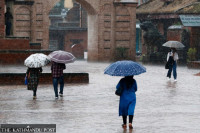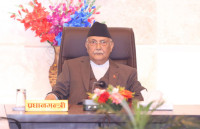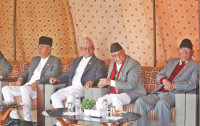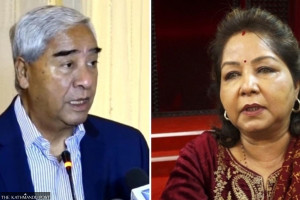Opinion
A little of both
Conditional continuity of Nepali citizenship could be a solution to the dual nationality debate
Bishnu P Ghimire
Nepalis have been emigrating to neighbouring countries since centuries. Their migration to the Middle East, US, Europe and other parts of the world in large numbers, however, began after the restoration of multiparty democracy in 1990. The current Nepali diaspora can be categorised on the basis of geographical distribution into those living in South Asia (Saarc), Arab and Middle Eastern countries, Southeast Asia, Australia, New Zealand, Canada and the US.
Who’s a citizen?
According to the Non-Resident Nepali Act 2008, a non-resident Nepali (NRN) means “a foreign citizen of Nepali origin and this term also includes Nepali citizens residing abroad”. Both foreign citizens and residents in Saarc countries are excluded from this definition. The current NRN movement for Continuation of Nepali Citizenship, which leads to the provision of dual citizenship, focuses only on migrants living in countries apart from Saarc.
Every country has legal provisions and accepted rules and regulations to decide the citizenship of its people. If more than one country recognises a person as its citizen, then that person has dual citizenship. Some countries do not allow the possession of dual citizenship, and such persons have to choose between the two. The trend of accepting and adopting dual citizenship has been increasing in many countries. This phenomenon gained momentum especially after globalisation and liberalisation that began in the early 1980s and popularised the notion of “citizens without borders”. Law professor David Abraham at the University of Miami describes citizenships in today’s globalised world as being “like credit cards, different ones in the wallet being better for different uses”.
More than 60 countries in the world provide dual citizenship. India, for example, has a provision for Overseas Citizen of India (OCI) with applied conditions. OCIs do not have voting rights, they cannot hold an Indian passport or apply for political or constitutional positions and they normally do not hold government positions. However, there are no restrictions on movement within India and they can hold and inherit limited property. India also has a system of 15-year card for Person of Indian Origin. The Maldives, Myanmar and Pakistan permit dual citizenship with levels of exceptional prohibition. This makes the issue of dual citizenship extremely sensitive and polemical.
Of two countries
In Nepal, dual citizenship is a complicated issue. Therefore, the need of the hour is to develop a fair policy for all Nepalis living abroad. The Nepali Congress and the CPN-UML have declared their willingness to accept only NRN citizenship, whereas the UCPN (Maoist) and the Federal Socialist Party have agreed to accept dual citizenship for NRNs. A few senior UML party leaders have argued that dual citizenship might not be a feasible concept for Nepal in its present context because of, one, the government’s lack of capacity to manage it, two, fear of misuse of citizenship rights, three, fear of concentration of natural resources among the elite and outflow of money and, four, fear of lack of loyalty to the country.
Recently, the Minister for General Administration, Lal Babu Pandit, announced that he would take serious action against the approximately 1,100 government officials holding Green Cards and Permanent Residency (PR). Politicians and policymakers should be mindful that Green Cards and PR are not citizenships; they are used as visas to stay indefinitely in the country that issues them. The Nepal government should not see them as foreigners as this will make them stateless.
The main advantages of dual citizenship are being able to live, work, retain property and claim benefits in two different countries. However, the benefits of holding dual citizenship may vary drastically depending on the countries involved. The provision of dual citizenship might actually enhance ‘brain gain’ and mitigate ‘brain drain’ that is associated with the unidirectional movement of migrants, especially the highly skilled from Nepal to the advanced countries. Moreover, remittance and investments by NRNs have contributed immensely to Nepal’s economy.
Dual citizenship means having responsibilities, like taxation and military service, in both the countries. Tax laws for dual citizens vary between countries, and are often tied to employment and residency. For example, a UK domicile has to pay tax to the UK government if he or she owns property abroad. Two passports make international travel confusing and difficult as many countries do not accept dual citizenship. This has benefited many developed countries as they selectively recruit and retain talent from the developing countries in the face of discrimination and unfair migration policies. Professor David Abraham compares dual citizenship to bigamy, and he questions how one can give one’s heart and soul to more than one country.
In Nepal, the debate on the pros and cons of dual citizenship continues. Some argue that NRNs can contribute to Nepal’s economic development through investment and new technology while some highlight the emotional, psychological and cultural dimension attached to the country and its people while discarding the give and take relation. It is, therefore, essential to address the sentiments of all in the provision of dual citizenship and not only view it as a matter of material loss or gain.
As the general public seems to have limited knowledge about the provision and its consequences, more research and awareness campaigns should be conducted besides disseminating information on conditionality including tax. Evidences from the neighbouring countries of India and China suggest that the provision of unconditional dual citizenship or the continuation of citizenship will not guarantee positive change and investment in Nepal. Overall economic growth, improved rule of law and creation of employment opportunities will play a key role in attracting Nepalis living abroad. In Nepal’s current socio-political context, unconditional dual citizenship or continuation of Nepali citizenship is less likely. But Nepal cannot be an exception to the current global trend. Therefore, conditional continuity of Nepali citizenship seems to be a logical way out as it can create more harmony and a win-win situation between resident and non-resident Nepalis.
Ghimire is associated with the South Asia School of Rural Reconstruction, Kathmandu




 16.1°C Kathmandu
16.1°C Kathmandu










